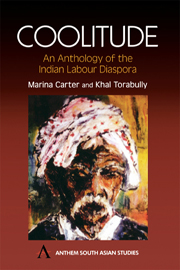Book contents
- Frontmatter
- Contents
- Introduction
- The Coolie Odyssey: A Voyage In Time And Space
- Thrice Victimized: Casting The Coolie
- Surviving Indenture
- Reclaiming The ‘Other’: Diaspora Indians And The Coolie Heritage
- Some Theoretical Premises Of Coolitude
- Conclusion: Revoicing the Coolie
- Poetic And Critical Texts Of Coolitude
- Notes
- Bibliography
The Coolie Odyssey: A Voyage In Time And Space
Published online by Cambridge University Press: 05 March 2012
- Frontmatter
- Contents
- Introduction
- The Coolie Odyssey: A Voyage In Time And Space
- Thrice Victimized: Casting The Coolie
- Surviving Indenture
- Reclaiming The ‘Other’: Diaspora Indians And The Coolie Heritage
- Some Theoretical Premises Of Coolitude
- Conclusion: Revoicing the Coolie
- Poetic And Critical Texts Of Coolitude
- Notes
- Bibliography
Summary
‘The Beyond is, first of all, for the coolie who settles, a confused poetics, pregnant with silence, looks, unsaid words. This last-comer was forced to situate himself in this new cultural challenge where the other is an ambiguous figure, bearer of signs of reconnaissance and annihilation, and capable of wrecking symbols. The game of anomy, based on the absence of social landmarks, pushed the coolie to the bottom of the ladder, out of speech.’
K Torabully, Coolitude, 1996, p. 59.The metaphor of the voyage was played out throughout the coolie's life. From the first crossing of the kala pani – that forbidden sea journey – the migrant was cast in the dual role of adventurer and victim. Coolitude explores the concept of the ocean as a nodal moment of migration, a space for destruction of identity, yet also one of regeneration, when an aesthetics of migration was created. This chapter revisits the recruitment of the coolie and the experience of sea-crossing, detailing the expectations and experiences of the overseas migrant, the raw emotion of transition and upheaval, of uncertainty and struggle, the evolution of another identity beyond India.
The Moment of Departure – Coolie Choices and Voices
The testimonies of migrants frequently bear witness to a pre-existing decision to look for work away from their native village, to join the armies of rural Indians tramping the roads looking for seasonal employment, before the fateful meeting with a recruiter that was to lead them much further afield, to a distant colony.
- Type
- Chapter
- Information
- CoolitudeAn Anthology of the Indian Labour Diaspora, pp. 17 - 44Publisher: Anthem PressPrint publication year: 2002
- 1
- Cited by



